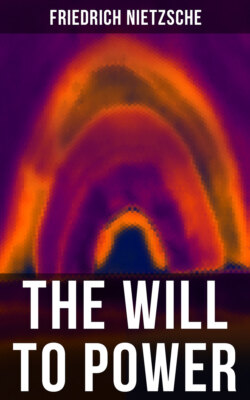Читать книгу Nietzsche: The Will to Power - FRIEDRICH NIETZSCHE, Friedrich Nietzsche - Страница 9
На сайте Литреса книга снята с продажи.
A Plan
ОглавлениеTable of Contents
1. Nihilism is at our door: whence comes this most gruesome of all guests to us?—To begin with, it is a mistake to point to "social evils," "physiological degeneration," or even to corruption as a cause of Nihilism. This is the most straightforward and most sympathetic age that ever was. Evil, whether spiritual, physical, or intellectual, is, in itself, quite unable to introduce Nihilism, i.e., the absolute repudiation of worth, purpose, desirability. These evils allow of yet other and quite different explanations. But there is one very definite explanation of the phenomena: Nihilism harbours in the heart of Christian morals.
2. The downfall of Christianity,—through its morality (which is insuperable), which finally turns against the Christian God Himself (the sense of truth, highly developed through Christianity, ultimately revolts against the falsehood and fictitiousness of all Christian interpretations of the world and its history. The recoil-stroke of "God is Truth" in the fanatical Belief, is: "All is false." Buddhism of action....).
3. Doubt in morality is the decisive factor. The downfall of the moral interpretation of the universe, which loses its raison d'être once it has tried to take flight to a Beyond, meets its end in Nihilism. "Nothing has any purpose" (the inconsistency of one explanation of the world, to which men have devoted untold energy,—gives rise to the suspicion that all explanations may perhaps be false). The Buddhistic feature: a yearning for nonentity (Indian Buddhism has no fundamentally moral development at the back of it; that is why Nihilism in its case means only morality not overcome; existence is regarded as a punishment and conceived as an error; error is thus held to be punishment—a moral valuation). Philosophical attempts to overcome the "moral God" (Hegel, Pantheism). The vanquishing of popular ideals: the wizard, the saint, the bard. Antagonism of "true" and "beautiful" and "good."
4. Against "purposelessness" on the one hand, against moral valuations on the other: how far has all science and philosophy been cultivated heretofore under the influence of moral judgments? And have we not got the additional factor—the enmity of science, into the bargain? Or the prejudice against science? Criticism of Spinoza. Christian valuations everywhere present as remnants in socialistic and positivistic systems. A criticism of Christian morality is altogether lacking.
5. The Nihilistic consequences of present natural science (along with its attempts to escape into a Beyond). Out of its practice there finally arises a certain self-annihilation, an antagonistic attitude towards itself—a sort of anti-scientificality. Since Copernicus man has been rolling away from the centre towards x.
6. The Nihilistic consequences of the political and politico-economical way of thinking, where all principles at length become tainted with the atmosphere of the platform: the breath of mediocrity, insignificance, dishonesty, etc. Nationalism. Anarchy, etc. Punishment. Everywhere the deliverer is missing, either as a class or as a single man—the justifier.
7. Nihilistic consequences of history and of the "practical historian," i.e., the romanticist. The attitude of art is quite unoriginal in modern life. Its gloominess. Goethe's so-called Olympian State.
8. Art and the preparation of Nihilism. Romanticism (the conclusion of Wagner's Ring of the Nibelung).
